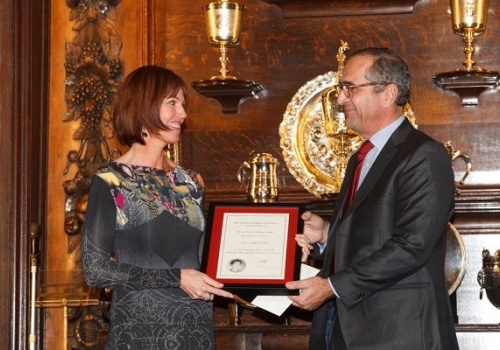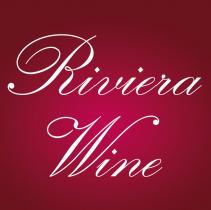
There are only 367 Masters of Wine in the world, and Louise Sydbeck, founder of Riviera Wine and author of the Yacht Cru Wine Guide is proud to be one of them. But as Louise explains, mastering wine involves lifelong learning driven by passion and the pursuit of excellence in matching wines with personal preference.
OnboardOnline: What does it mean to be a Master of Wine and how did you achieve this title?
Louise Sydbeck: It’s a good question really and personally I'm not at all comfortable with the title ‘Master’. After having studied wine intensely for over 15 years it’s clear that it’s not a subject anyone can ever really master, I prefer to see myself as a lifelong student of wine!
As a title however, it means that a person has passed a very difficult 4-5 day exam covering all aspects of the world of wine. Candidates are required to write essays about viticulture, wine making, the business of wine, cultural aspects and taste preference. You also have to write a dissertation and identify 36 wines in a blind tasting.
The pass rate is very low at around 10% and currently there are just 367 Masters of Wine in the world. I was the 100th woman to be awarded the title in 2014 - it took me seven years to get there so it was a joyous day indeed when I finally made it!
OO: Are you in touch with other Masters of Wine and do you continue to learn from each other?
LS: I think one of the most valuable aspects of studying to become a Master of Wine is the connections you forge during the years as a student. Many Masters of Wine and students of the program hold key positions in the wine trade on a global level. These connections facilitate access to valuable information, and can be a huge help in sourcing rare wines and authenticating bottles.
The Institute of Masters of Wine also organizes educational events and wine trips for their members. Currently I'm writing from an airport lounge on my way to Argentina for a field trip with key wine makers and producers. So yes, we do continue to learn but I still miss being a student when the rate of learning was even more intense!
 OO: Dealing at the high end of the market, such a title must influence peoples’ perception of your company and the service you offer?
OO: Dealing at the high end of the market, such a title must influence peoples’ perception of your company and the service you offer?
LS: From feedback we have received, it seems to give a certain reassurance to our clients. I guess they realise that we do this because we love wine and that we really want to share our passion for the subject.
Initially when I started out supplying wine to yachts and offering the WSET Diploma, I often felt that our company wasn’t really worthy of supplying the largest and most exclusive yachts in the world. I think this is partly what pushed me to do the Master of Wine program. I wanted to feel I had done all I possibly could to offer a first-class service both in terms of knowledge, passion and commitment. Today we are happy and proud to be the only yacht wine supplier with such expertise at the helm.
OO: What are the main differences in terms of your approach to an onboard cellar compared to a cellar ashore?
LS: The initial factor to consider when building a wine cellar for someone is, of course, the client’s taste and preferences. After that the only difference between cellars ashore or onboard is the technical aspect in terms of storage conditions.
Storage on a yacht is never ideal (often far from it) so we advise clients to buy limited amounts of wine and stock up each season rather than stocking up for a few years.
However, we also have clients who wish to buy larger quantities to secure certain wines and vintages and to have access to these at very short notice. For these clients we store their wines in our air-conditioned bonded warehouse and provide next day delivery.
OO: Do you mostly recommend wines from your own stock or do you source particular wines for individual clients?
LS: As I love wine and consider it an honour to be working within the industry (corny but true), we only recommend wines that we really enjoy or wines we think are suitable for a particular client. We have some wines in stock that I don’t find of any interest, but they are big sellers so we stock them as a service to our clients but we wouldn’t recommend them when we compile a wine list.
OO: Riviera Wine is based in the south of France but you supply yachts globally – which regions are the busiest for you?
LS: We are based in Antibes where we have an office by Port Vauban and a warehouse just outside town. However, we are a global supplier and we ship wines all over the world. In the past few months we have shipped to Australia, Singapore, Florida, Los Angeles and New Caledonia! Around 80% of our sales are in Europe, along the Riviera as well as the yards in Germany and Holland. Thanks to our shipping partners we can also offer surprisingly good prices even for shipments far away.

OO: Apart from sharing your expert knowledge with clients, what does Riviera Wine offer in the way of information and wine training for the interior department?
LS: We organize informal wine tastings for larger groups and wine tastings onboard for crew and owners. We also provide our internationally recognized WSET (Wine and Spirit Education Trust) wine courses which are very popular with crew. Riviera Wine was the first company to introduce these to the yachting industry in 2007 and since then we have trained around 400 crew members.
It’s something I love to do and it’s a great way to get to know our clients better and to understand their needs. Since boats move around we also have an online educational blog with short articles and videos relevant to our industry.
OO: What does the WSET syllabus include?
LS: The WSET offers several qualifications and the most popular ones are Level 1 to Level 4. However, for our clients we’ve noticed that Level 1 tends to be too basic and Level 3 is a bit too intense for the majority.
We mostly offer Level 2 which is a three-day course covering service, food and wine pairing, wine making, the main grape varieties and wine regions and systematic tasting of over 40 delicious wines from around the world.
To many it’s a real eye opener and several of our students have caught the 'wine bug' as a result. Some go on to take Level 4 and one girl is now a wine maker in Australia. She wrote to me a few years ago to say it was thanks to our course she got into wine and it was great to hear!
OO: What are the most typical questions and misconceptions that you hear from crew?
LS: It’s really strange but I often hear crew members pronounce Veuve Cliquot as Veurve Cliquot instead. I’ve no idea why but there is no R in Veuve Cliquot! There’s also confusion around wine faults, for example, that if a wine has been badly stored the wine can become corked. This isn’t the case as wines tend to become oxidized or taste cooked if they are stored too warm, whereas a cork defect comes from a chemical present in the actual cork called 2,4,6 trichloranisole (TCA), not from inadequate storage conditions.
OO: You’ve also just written a book called The Yacht Cru Wine Guide – what made you decide to write it?
LS: After years of teaching the WSET course to interior crew I realised what a broad range of skills is required for a chief steward/ess. On top of having to manage crew, surprise guests with creative table settings and events, and have skills in mixology, accountancy and much more, they are also expected to have a certain wine knowledge. Quite a challenge really!
So I thought I should write a wine guide designed for the yachting industry focusing on the most relevant topics and questions we are asked. This includes how to manage a wine cellar onboard, wine service, wine storage, food and wine pairing, key wine categories in yachting and much more. The eBook is free to download from our website and the print version is out at the end of April.
OO: What’s the most interesting or surprising wine fact you’ve learned along the way?
LS: So, so many things and that’s what makes wine so fascinating. I'm a bit of a nerd when it comes to wine so I can get really excited about learning about new technology in wine making and viticultural discoveries like new yeast strains or bacterial activity in soil, but maybe this isn’t the right place to go into that! Another more practical thing I learned the other day is that you are not supposed to take off the black foil on a bottle of Dom Perignon before taking off the metal cage and that after having eaten an egg, wine smells like wet dog!
OO: Which wine is your personal favourite and how would you describe it?
LS: I actually don’t have any favourite wine as such but all the top wines I have tasted that move my heart and soul come from classical regions of the old world. Sometimes a wine can be such a glorious expression of art that I even get tears in my eyes. Last time it happened it was Pichon Comtesse Lalande 1982 from Pauillac in Bordeaux. It’s like the blood of Mother Nature through which she speaks to you and the outside world goes quiet, almost a spiritual experience, haleluja!
First published 27/2/2018


Post your comment
You cannot post comments until you have logged in.
Login to post a commentComments
No one has commented on this page yet.
RSS feed for comments on this page | RSS feed for all comments